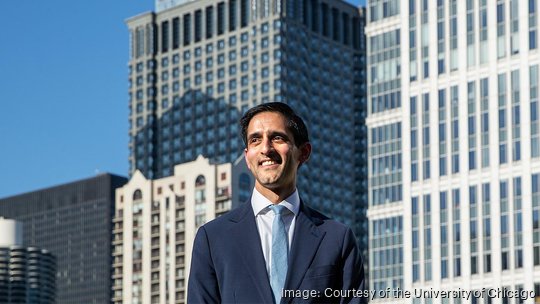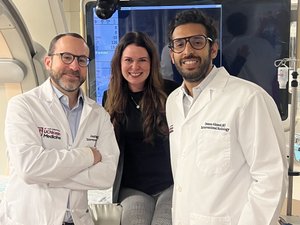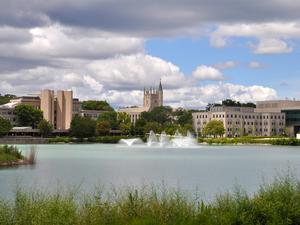
Recently named managing director of the University of Chicago's Polsky Center for Entrepreneurship and Innovation, Samir Mayekar is ready to help continue Chicago's momentum toward becoming the next hub for deep-tech commercialization.
When looking at the Windy City's and the state of Illinois' recent big wins — attracting the Chan Zuckerberg Biohub, getting selected as a hydrogen hub, earning a designation as a quantum tech hub — Mayekar sees one common thread: institutional collaboration.
He wants to continue to lead with that mindset in his next role.
Mayekar will help advance innovation, technology commercialization and entrepreneurship at UChicago after serving as deputy mayor for former Chicago Mayor Lori Lightfoot. Prior to working for the city, Mayekar also served in the Obama administration.
Although the University of Chicago recently ranked 68th in PitchBook's annual ranking of schools by startup founders, Mayekar thinks Chicago remains a top place to launch a company, something he's had some experience with.
With experience in private, public and nonprofit sectors, Mayekar said the most formative time of his career was as founder and CEO of NanoGraf. While a graduate student at Northwestern, Mayekar co-founded the battery startup, which recently raised an oversubscribed $65 million Series B, and he wants to bring that same success to young UChicago entrepreneurs.
Mayekar spoke with Chicago Inno about taking on his new role and what he sees as the biggest challenges facing young Chicago startups. This interview has been edited for length and clarity.
What attracted you to the managing director role at the Polsky Center?
My lived experience, the story of NanoGraf, is one of the reasons why I'm so attracted to the Polsky Center. As a grad student, I met my co-founders, we found a piece of technology from Argonne National Labs, and we built a company around it. That really changed our lives, and having the opportunity to help shape the next generation of entrepreneurs, to bring technology to market that's going to help solve some of society's biggest problems, that's deeply exciting to me.
What is the hardest part about transitioning from being a student inventor/entrepreneur to launching and founding a startup?
Being an entrepreneur in the sciences, especially if you're working in deep tech — whether that's life sciences or physical sciences — it's really difficult because the time horizon is much longer for bringing your innovation to market.
The second challenge is always capital. It's hard to raise money for long-time-horizon, capital-intensive industries. One of my duties at Polsky is going to be helping entrepreneurs coming out of the university ecosystem and connecting them with providers of capital to help bring their innovations to market.
The third challenge I faced was having a cohort. There weren't many companies like NanoGraf at the time. It's a much different ecosystem today — you have several accelerators that have been stood up like clean tech, data science and quantum. Now there's more of a cohort being built so there's a support network for entrepreneurs to help each other.
How has the startup market changed since you first launched NanoGraf?
Chicago is in a fundamentally different place than it was 10 years ago. Ten years ago, the biggest challenge was space. Now we're in a much different place: We've got Fulton Labs coming online, the Sterling Bay facility coming online, Hyde Park Labs will open next year. So I think the infrastructure and space component of science-based entrepreneurship is in a much better place.
What barriers still exist for Chicago entrepreneurs?
The first barrier is growth capital. We've improved pretty significantly on seed and Series A funding. When I started NanoGraf, Chicago was ranked 10th nationally in venture capital dollars, and during my time in City Hall we broke into the top five. But after [companies] raise that early-stage funding, as they want to grow, they are still going to the coasts. By collaborating with other players in the ecosystem, we want to try to attract more growth capital funds.
The second gap I want to focus on is matching great entrepreneurs in the sciences with the resources that they could tap into from the government. The American Rescue Plan, the Bipartisan Infrastructure Bill, the CHIPS Act, the Inflation Reduction Act — those are going to mobilize well over $10 trillion with investment.
Are there any specific areas that you plan to focus on most?
The technology verticals that I think are highly aligned with where the university has strengths, where our ecosystem is really getting behind and where the federal funding ecosystem is supporting. You think about clean technology investments, and that includes hydrogen — Polsky is the innovation lead on the $1 billion hydrogen hub that the Midwest just won. Clean energy is a natural fit. Life sciences. Data science. Quantum.







